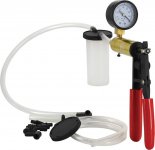Mike Millar
New member
- Joined
- Mar 18, 2017
- Messages
- 11
- Points
- 5
Hi Guys and Gals just a quick question regarding brake bleeding
Is it ok to use a vacuum pump to bleed the brakes
Cheers
M
Is it ok to use a vacuum pump to bleed the brakes
Cheers
M


